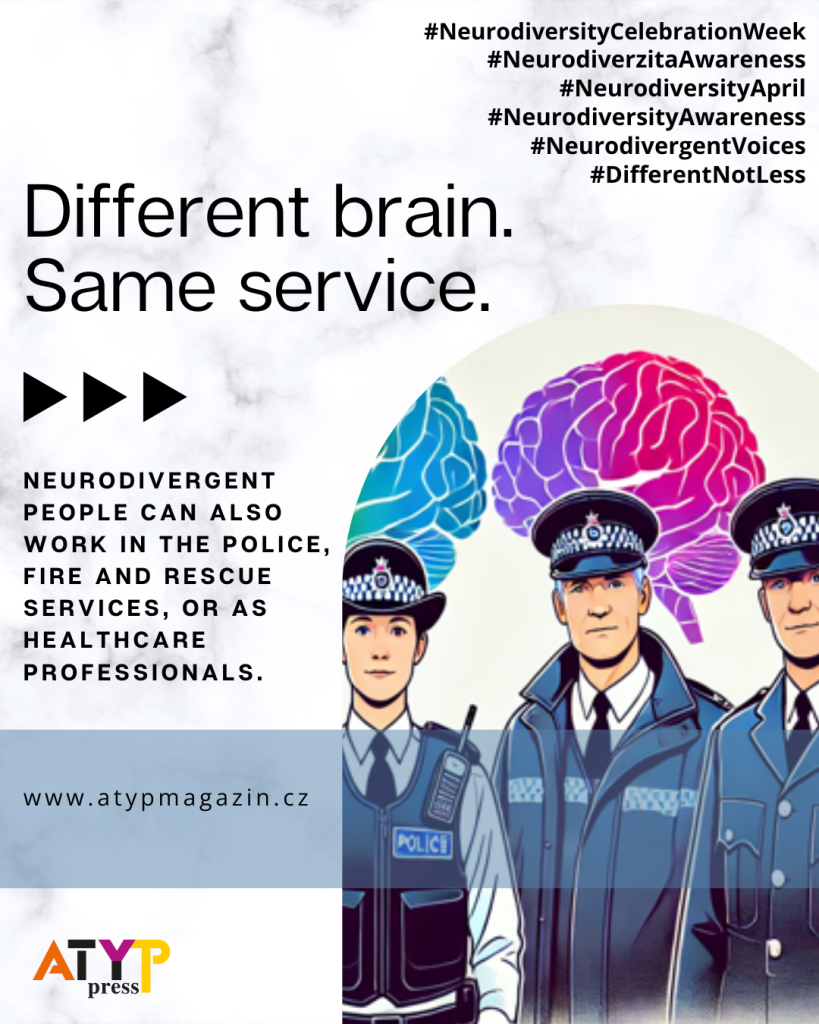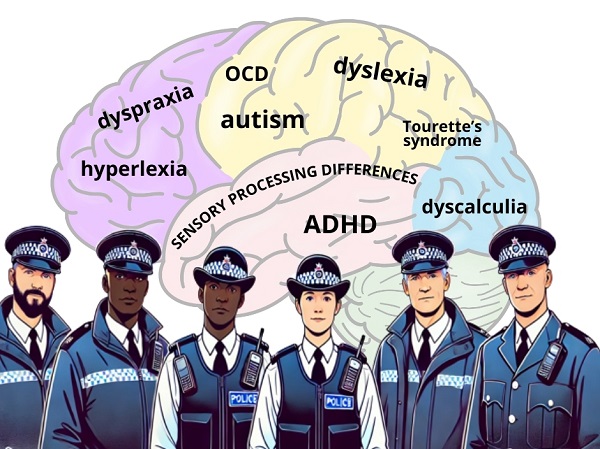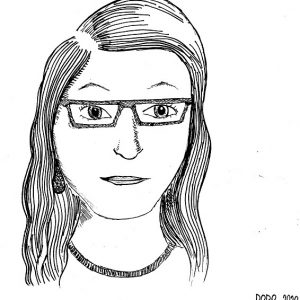The global initiative Neurodiversity Celebration Week took place from 17 to 23 March. On professional networks, international companies, coaches, and HR managers shared positive experiences of employing neurodivergent people. According to research, at least 15% of the population is neurodivergent. Among thousands of posts, we were particularly struck by the work of the Metropolitan Police Service, which openly shared the stories and needs of its neurodivergent employees throughout the week.
What Is Neurodiversity Celebration Week?
Neurodiversity Celebration Week is an international initiative aiming to challenge stereotypes about neurological differences and celebrate the diversity of human thinking. It was founded in 2018 by Siena Castellon, an autistic student with dyslexia, dyspraxia, and ADHD, who faced significant prejudice in the education system. Her goal was to shift the focus from “learning difficulties” to the talents and strengths of neurodivergent individuals.
During the week, organisations, schools, and companies host webinars, discussions, and workshops where neurodivergent people share their lived experiences and inspire others.
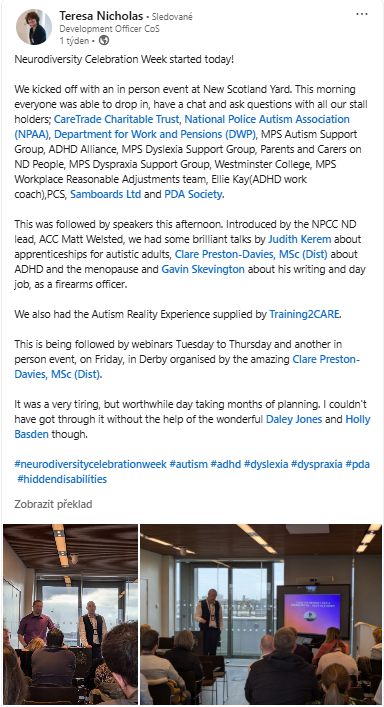 A Police Force That Listens to Neurodivergent Voices
A Police Force That Listens to Neurodivergent Voices
One of the standout figures of this year’s celebration was Teresa Nicholas, H&S/Accommodation Manager at the Metropolitan Police Service and Co-Chair of the MPS Autism Support Group.
Each day, she shared reflections on LinkedIn from the webinars she helped organise for Scotland Yard, featuring neurodivergent speakers from within the police force and beyond.
On Day 4, for instance, a police officer named Thaya spoke openly about being diagnosed in adulthood with autism, ADHD, OCD and PTSD.
“His parents were advised to seek support when he was a child, but due to language and cultural barriers, they didn’t understand. As is often the case for adults, the diagnosis came during a time of crisis—after years of confusion, there was finally an explanation for what had shaped his life. Today, he is in a better place and wants to support others on similar journeys,”
wrote Teresa Nicholas, who has long been involved in organising annual neurodiversity events at New Scotland Yard.
Day 1: Open Space for Questions and Sharing
The week kicked off with an informal event at New Scotland Yard, where attendees could drop in and chat with representatives from organisations such as the National Police Autism Association, ADHD Alliance, PDA Society, and various MPS support groups focused on autism, dyslexia, and dyspraxia. Also present were representatives from the Department for Work and Pensions (DWP), an ADHD work coach, Westminster College, and Training2CARE.
Day 2: Emotion, Grief and Inspiration
Day two featured three webinars. The first, led by Sean Kennedy and Mandy Aulak, offered a practical guide to the Specialist Victim Pathway (SVP).
The second addressed autism and grief. Teresa shared her own experience as the parent of an autistic daughter who had recently lost close family members. Two of her colleagues—both autistic—spoke about their own experiences of loss and how they coped.
The third webinar was led by police officer Sarah Johnson, who spoke openly about her struggles with dyslexia, her later ADHD diagnosis, and how she built her career in the police. The day ended with Dominic Bolas, who introduced a new initiative called Ark—a comprehensive support framework for neurodivergent officers within the Met.
“We aim to bring together all the brilliant work already happening across the organisation and create consistent support from day one until the day someone leaves,” Bolas explained.
Day 3: Tourette’s, Stigma and the “Superpower” Narrative
The third day focused on Tourette’s Syndrome (TS). Lucy Toghill from Tourettes Action offered practical insights into living with TS, including a parent’s perspective.
Later, Daley Jones from ADHD Alliance spoke about stigmatising language and the findings of a survey among Met staff.
The final session, titled The Superpower Divide, was led by James and Fawziyah from AtkinsRéalis. They discussed the dangers of portraying neurodivergence solely as a “superpower.” While traits like creativity and hyperfocus can be strengths, they often coexist with anxiety, exhaustion, and self-doubt.
Day 4: Neurodivergent Leadership in Policing
This day focused on leadership and career progression for neurodivergent individuals in the police force. Teresa Nicholas and James Bird from West Midlands Police shared practical strategies for supporting neurodivergent colleagues in leadership roles.
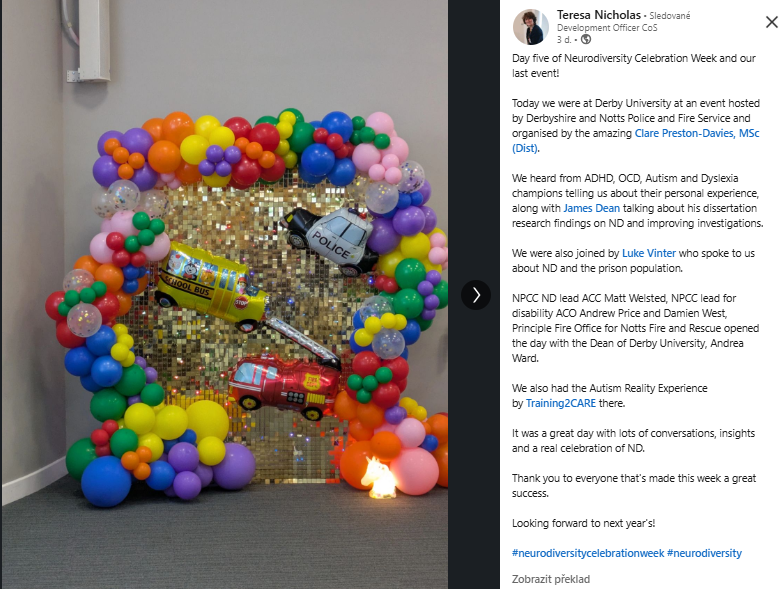 Day 5: Celebrating Across Institutions
Day 5: Celebrating Across Institutions
The final event took place at the University of Derby, hosted by police and fire services from Derbyshire and Nottinghamshire. Neurodivergent officers living with ADHD, OCD, autism and dyslexia shared their personal stories. James Dean presented research on how neurodivergent perspectives can improve investigative processes. There were also discussions about neurodivergence within the prison system, and participants experienced the Autism Reality Experience by Training2CARE, which simulates sensory and communication challenges often faced by autistic people.
“It was a fantastic day full of conversations, insights and a true celebration of neurodiversity,” wrote Teresa Nicholas.
More Than a Celebration—A Call for Support
Neurodiversity Celebration Week is not just about celebrating difference—it’s about acceptance, support, and changing environments so that neurodivergent individuals can truly thrive.
“When our thoughts race, who helps us make sense of them?” asks Stephanie Pérez, a student of Health and Social Care Management, on LinkedIn. “When I was diagnosed with dyslexia, therapeutic support grounded me—it was invaluable. Seeking help is not a weakness. It’s how we embrace who we are and unlock our potential. Let’s continue celebrating our differences, lean into our strengths, and build spaces where everyone can flourish.”
Can You Imagine Something Like This Happening in the Czech Police?
We can—but the reality is different for now.
In the second issue of the printed ATYP Special 2, we published an interview with a former Czech police officer who was dismissed after years of service, simply because he received a diagnosis of Asperger’s syndrome.
That’s why it’s so valuable to see what’s possible elsewhere—and to keep working towards environments that include and empower everyone.
__________
text Dagmar Edith Hola / photos – screen from Linkedin Teresa Nicholas, H&S/Accommodation Manager at Metropolitan Police
